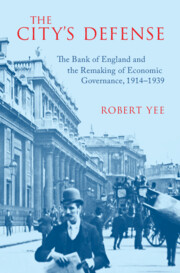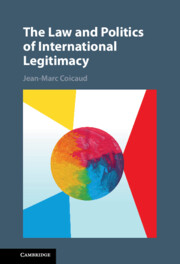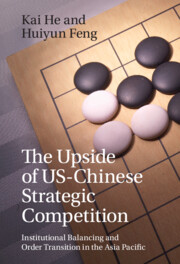Refine search
Actions for selected content:
114 results
1 - Changing Approaches to Interference in the Global South
-
- Book:
- New Regional Authorities
- Published online:
- 17 December 2025
- Print publication:
- 08 January 2026, pp 1-32
-
- Chapter
- Export citation
Introduction
-
- Book:
- The Political Psychology of Citizens in Rising China
- Published online:
- 04 December 2025
- Print publication:
- 08 January 2026, pp 1-34
-
- Chapter
- Export citation

New Regional Authorities
- Self-Determination and the Global South
-
- Published online:
- 17 December 2025
- Print publication:
- 08 January 2026
9 - Japan and New Orders in East Asia, 1914–1945
- from Part III - To the Pacific War
-
-
- Book:
- East Asia and the Modern International Order
- Published online:
- 25 November 2025
- Print publication:
- 20 November 2025, pp 166-184
-
- Chapter
- Export citation
The Unconstrained Future of World Order: The Assault on Democratic Constraint and Implications for US Global Leadership
-
- Journal:
- International Organization / Volume 79 / Issue S1 / December 2025
- Published online by Cambridge University Press:
- 20 November 2025, pp. S71-S87
- Print publication:
- December 2025
-
- Article
-
- You have access
- Open access
- HTML
- Export citation
5 - The Chinese Exclusion Act
- from Part II - The Imperial Era
-
-
- Book:
- East Asia and the Modern International Order
- Published online:
- 25 November 2025
- Print publication:
- 20 November 2025, pp 90-108
-
- Chapter
- Export citation
Allies and Access: Implications of an American Turn Away from Alliances
-
- Journal:
- International Organization / Volume 79 / Issue S1 / December 2025
- Published online by Cambridge University Press:
- 20 November 2025, pp. S103-S116
- Print publication:
- December 2025
-
- Article
-
- You have access
- Open access
- HTML
- Export citation
Further Back to the Future: Neo-Royalism, the Trump Administration, and the Emerging International System
-
- Journal:
- International Organization / Volume 79 / Issue S1 / December 2025
- Published online by Cambridge University Press:
- 20 November 2025, pp. S12-S25
- Print publication:
- December 2025
-
- Article
-
- You have access
- Open access
- HTML
- Export citation
The New Age of Myth: Political Narratives and the Reconstitution of World Order
-
- Journal:
- International Organization / Volume 79 / Issue S1 / December 2025
- Published online by Cambridge University Press:
- 20 November 2025, pp. S44-S56
- Print publication:
- December 2025
-
- Article
-
- You have access
- HTML
- Export citation
Global politics of cultural heritage: Status, authority, and geopolitics
-
- Journal:
- Review of International Studies , First View
- Published online by Cambridge University Press:
- 11 November 2025, pp. 1-13
-
- Article
- Export citation
2 - Henry Strakosch and Reconstruction
-
- Book:
- The City's Defense
- Published online:
- 09 October 2025
- Print publication:
- 23 October 2025, pp 66-102
-
- Chapter
- Export citation

The City's Defense
- The Bank of England and the Remaking of Economic Governance, 1914–1939
-
- Published online:
- 09 October 2025
- Print publication:
- 23 October 2025
Covenants without the Sword: Consent and Enforcement in Market Anarchism
-
- Journal:
- Legal Theory , First View
- Published online by Cambridge University Press:
- 08 October 2025, pp. 1-15
-
- Article
-
- You have access
- Open access
- HTML
- Export citation
Chapter 1 - The nature of international law
-
- Book:
- International Law
- Published online:
- 26 July 2025
- Print publication:
- 31 July 2025, pp 1-49
-
- Chapter
- Export citation
18 - Change in International Order and Legitimacy
- from Part V - International Legitimacy and Change
-
- Book:
- The Law and Politics of International Legitimacy
- Published online:
- 14 July 2025
- Print publication:
- 24 July 2025, pp 350-360
-
- Chapter
- Export citation
Conclusion
-
- Book:
- The Law and Politics of International Legitimacy
- Published online:
- 14 July 2025
- Print publication:
- 24 July 2025, pp 488-491
-
- Chapter
- Export citation
17 - Change of International Order and Legitimacy
- from Part V - International Legitimacy and Change
-
- Book:
- The Law and Politics of International Legitimacy
- Published online:
- 14 July 2025
- Print publication:
- 24 July 2025, pp 318-349
-
- Chapter
- Export citation
Introduction
-
- Book:
- The Law and Politics of International Legitimacy
- Published online:
- 14 July 2025
- Print publication:
- 24 July 2025, pp 1-8
-
- Chapter
- Export citation

The Law and Politics of International Legitimacy
-
- Published online:
- 14 July 2025
- Print publication:
- 24 July 2025

The Upside of US-Chinese Strategic Competition
- Institutional Balancing and Order Transition in the Asia Pacific
-
- Published online:
- 25 June 2025
- Print publication:
- 05 June 2025
